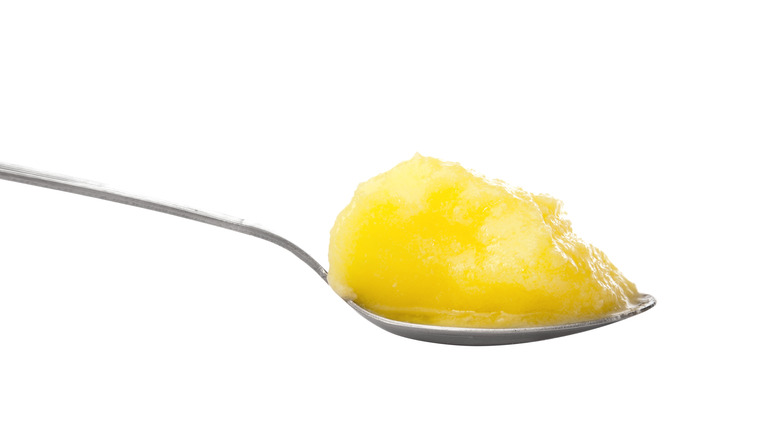Should You Store Ghee In The Refrigerator?
If you enjoy cooking with butter, chances are you may have cooked with ghee before, even if you didn't know what it was called. Ghee has been a part of South Asian food culture for thousands of years, and is traditionally made by boiling spoiled heavy cream, then reducing the heat and cooking until the liquid first changes color, then stopping when the milk solids finally separate from the fat. It can also be made by cooking sweet cream butter until all of its water evaporates, and all that is left are its fat and its milk solids. The fat is then cooked until it is brown and gold-colored. Essentially, ghee is a form of clarified butter (but not all clarified butter is ghee).
Because it isn't as perishable, ghee is said to be the perfect fat for South Asia, a region known for experiencing extreme heat on a regular basis. It is so important to South Asian culture it is even the stuff of legends: the Hindu lord of the creatures, Prajapati, is said to have first created ghee by rubbing his hands together.
Given that ghee was formulated to withstand extreme temperatures, it would be common sense to assume that it doesn't need any refrigeration to stay fresh. But as with many things, the reality may be slightly more complicated than that.
What happens when ghee is refrigerated
Even though ghee is able to withstand India's punishing temperatures, the ingredient isn't indestructable. In order to keep ghee for extended periods of time, it is still best to keep the ingredient away from too much heat, which means storing it in an airtight container, and in a cool and dry place. Recommendations which point to how long ghee can last without refrigeration vary between three months to six. But if you want to be certain that the ingredient won't spoil, it is still best to store this versatile cooking fat in the fridge, where it can keep for up to a year. Like most fats, ghee goes from being liquid to solid when it gets cold, so be prepared to use a clean, dry spoon to take what you need. While freezing also works, it isn't ideal, since ghee's quality does deteriorate over time.
While ghee can stand up to heat, it is particularly vulnerable to oxidation and moisture — two factors that can cause it to go rancid more quickly. Because of this, it is best to divide your ghee into two airtight containers — a big one for storing, and a smaller one that holds the ghee you cook with, which can be opened and closed several times a day. Just remember to use a dry, clean utensil to scoop out the ghee every time.

